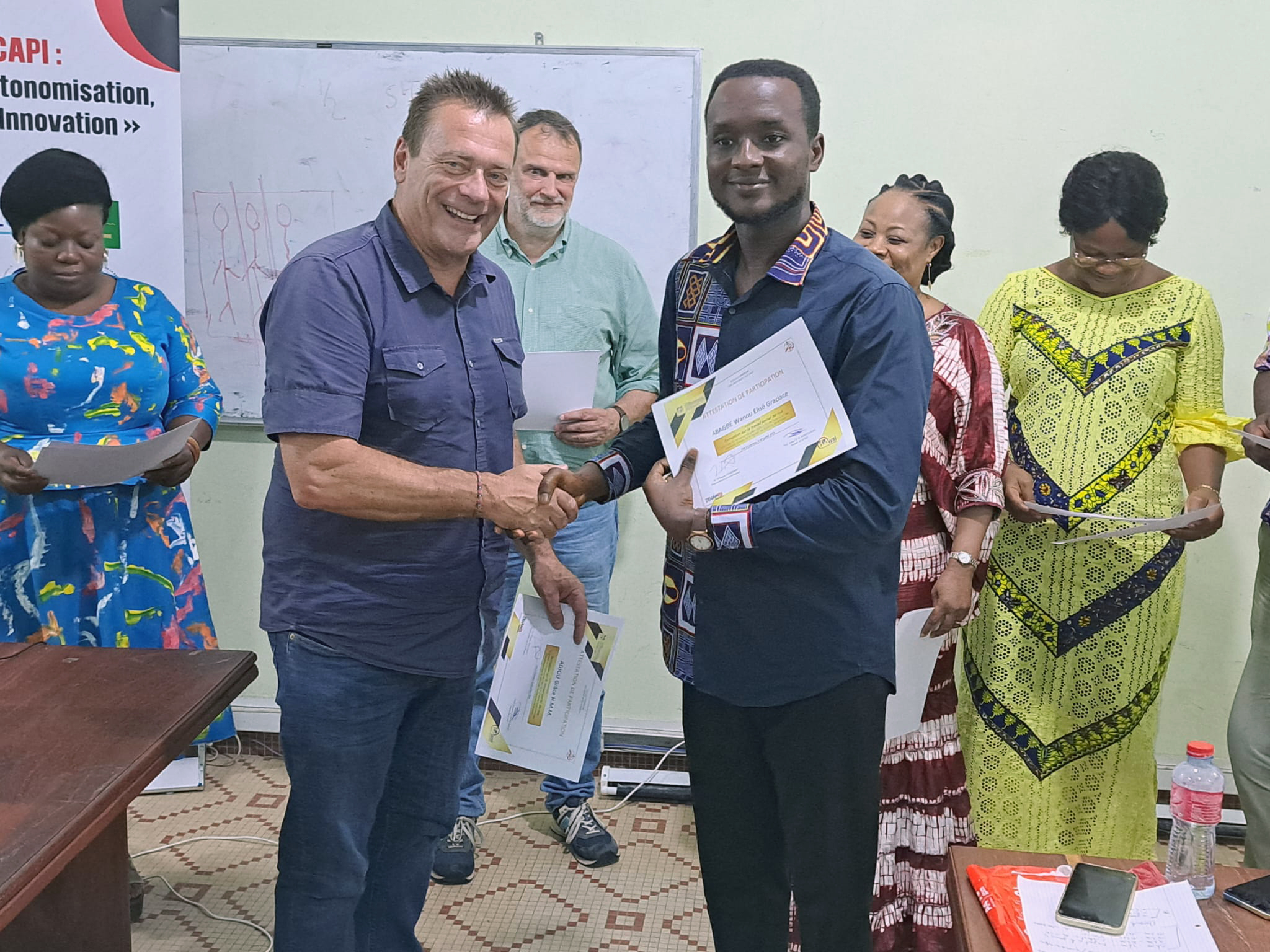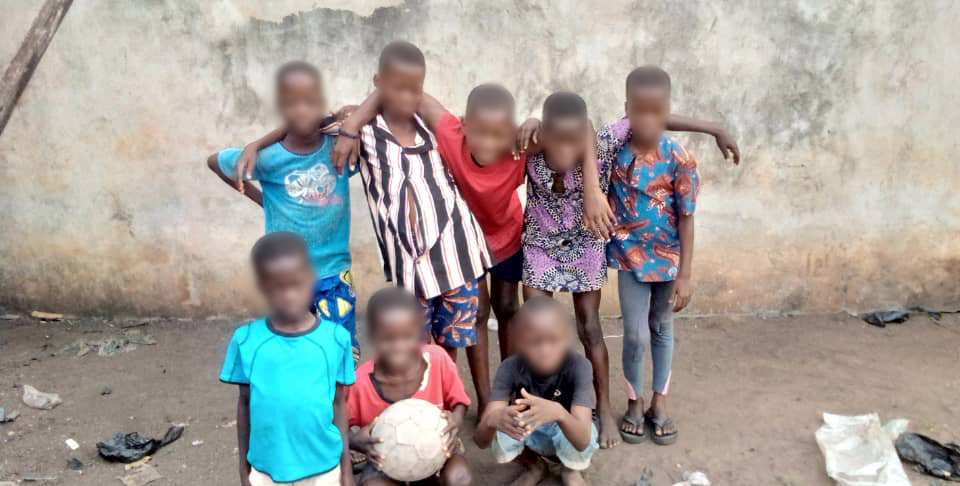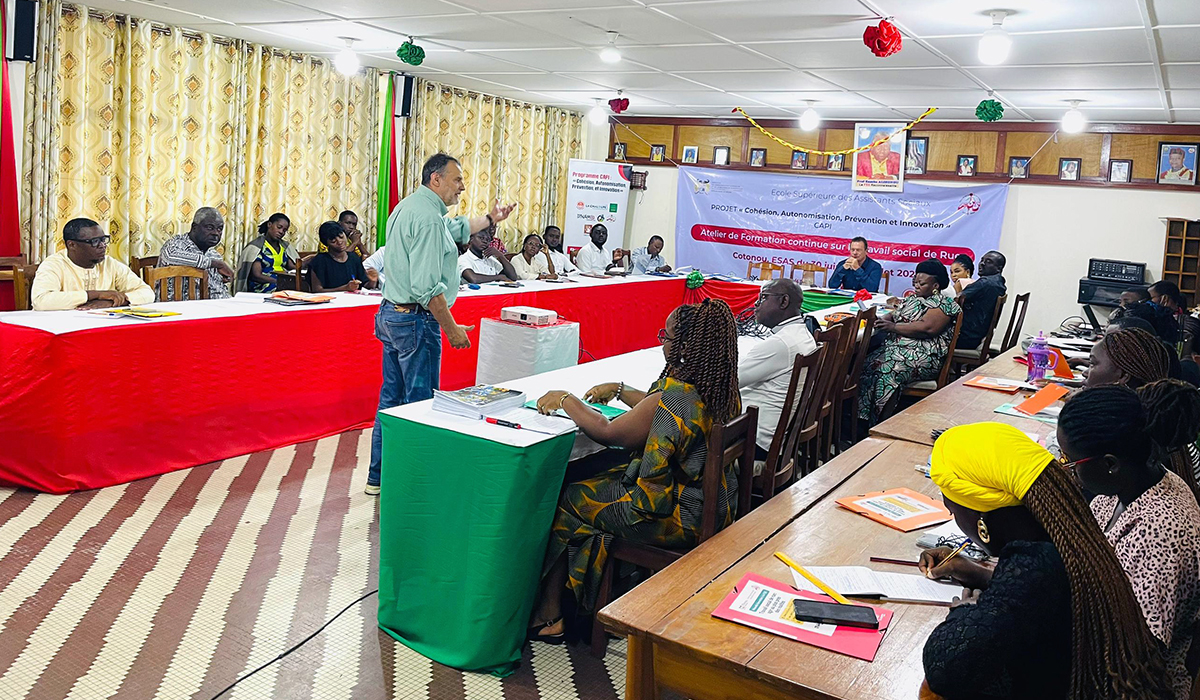Mission to Benin: sharing knowledge, strengthening the profession
In July 2025, Dynamo International and an expert in SSW[1] methodology visited several locations in the country. Under the aegis of the CAPI[2] project, funded by WBI and supported by CNCD-11.11.11, the mission aimed to strengthen the network of Beninese street social workers and to improve systems for prevention, protection, and the socio-professional integration of vulnerable children and youth. While the ambition to consolidate partnerships was clearly present, the delegation’s main objective was to promote the professionalization of street social work.
In collaboration with Dynamo International, the Higher School of Social Work Assistants set up a program focused on street social work methodology for professionals in the field. Over the course of four days[3], this training workshop provided an opportunity to present the realities on the ground while identifying various needs.
Led by numerous speakers and trainers[4], the gathering encouraged the exchange of practices and was rich in analysis and reflection. Attended by representatives from the Ministry of Social Affairs and local partner organizations involved in the CAPI project, the event offered a clear picture of the sector and helped to strengthen foundations that were already well established.
Following an initial presentation on the skills and competencies required for the profession of street social work, the screening of documentary films highlighted the history and projects of certain organizations. In a playful and participatory setting, several activities were centered around fieldwork simulations and role-playing. There were also practical case studies, including an exercise in which participants had to design and present a narrative based on a real-life event or inspired by the experience of a child living on the streets.

With regard to the activities already carried out by the various stakeholders involved in the CAPI project, it was necessary to assess the progress made and offer reflections on future directions and new strategic orientations. In addition, the legal contextualizations not only provided an overarching view of the profession, but also highlighted the specific characteristics of each organization. Beyond the shared objective of creating a framework for the prevention and protection of vulnerable children and youth, strengthening professional skills remained one of the key goals of the mission. As a result, starting from the new academic year, a SSW module will be integrated into the initial training curriculum for social work assistants.

The training concluded with a meeting involving field actors in the Calavi-Tokpa area, a locality located about twenty kilometers from Cotonou.
The delegation was welcomed by a community mother, a SSW, members of the market committee, and around fifteen girls aged between seven and fifteen. Given the complexity of a profession with many facets, preventive street social work cannot be carried out in isolation—synergies are essential. In Benin, and particularly in rural areas, community mothers are beacons of support that mothers and young girls can rely on. As true intermediaries between communities and health services, they serve as key reference points in the promotion of health and well-being.
Participant in the training, the SSW from Calavi-Tokpa presented the projects developed at her “baraque.” In this context, “baraques” are safe spaces open six days a week, offering welcome, support, listening, and guidance. At the heart of this hub dedicated to the prevention and protection of children facing exclusion, awareness-raising efforts are carried out around risky behaviors, particularly concerning GBV (gender-based violence). Parents are also made aware to the importance of schooling, and school supplies are provided for children who work at the market alongside their mothers.
With mobility in mind, outreach rounds are also organized in neighborhoods in the city center. Thanks to the support of community mothers and a few families, it is possible for some children to access vocational training, such as hairdressing or sewing. Finally, in cases where children face difficulties with family reunification, they are either directly reintegrated into their families or referred to the GUPS (Counter Social Protection Office), which then transfers them to the reception and transit center in the commune of Allada.
Walking through the Allada market provided an opportunity to meet the committee at their workplace. The neighborhood chief and the head of security also praised the synergy between their actions and those of the social team. Since the team’s presence in the market, incidents—sometimes involving petty crimes—committed by children in street situations have drastically decreased. When a child appears lost or abandoned, the SSW team steps in to ensure proper care.
The meeting concluded with a clear recommendation: continuing these activities will require more support. The final stop was a visit to the commune of Ouidah, where the SSW and the community mother described their target population.
On that day, the case of a girl searching for her parents was reported. Thanks to the swift action of local officials and the team, the girl was reunited with her family.
This was the second time such a situation had been brought to the team’s attention by the community.
Thandiwe Cattier
[1] Street social work
[2] The CAPI project – Cohesion, Empowerment, Prevention and Innovation – is part of the 2024–2028 bilateral cooperation program between the Republic of Benin and the Wallonia-Brussels Federation, under Axis 4: “Youth support, socio-economic integration of vulnerable people, and sports.”
[3] The workshop was officially launched by the Secretary General of the Faculty of Health Sciences (FHS), representing the Dean.
[4] The mission’s partners are ESAS (Higher School of Social Work Assistants), GRES (Group of Specialized Educators of Benin), Terres Rouges ASBL, Rone-RBC (Network of Non-State Rehabilitation Organizations), La Pommeraie ASBL, Carrefour Jeunesse Afrique, and La Chaloupe AMO.



